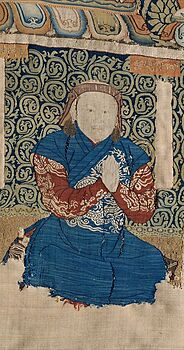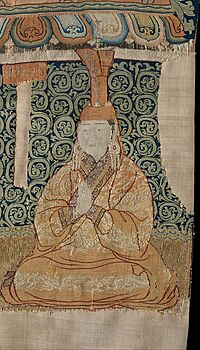Khutughtu Khan Kusala facts for kids
Quick facts for kids Emperor Mingzong of Yuan元明宗 Khutughtu Khan 忽都篤汗 ᠬᠤᠲᠤᠭᠲᠤ ᠬᠠᠭᠠᠨ |
|||||||||||||||||||||
|---|---|---|---|---|---|---|---|---|---|---|---|---|---|---|---|---|---|---|---|---|---|
| 13th Khagan of the Mongol Empire (Nominal due to the empire's division) Emperor of China (9th Emperor of the Yuan dynasty) |
|||||||||||||||||||||
| Emperor of the Yuan dynasty | |||||||||||||||||||||
| Reign | 27 February 1329 – 30 August 1329 | ||||||||||||||||||||
| Coronation | 27 February 1329 | ||||||||||||||||||||
| Predecessor | Jayaatu Khan Tugh Temür (first reign) | ||||||||||||||||||||
| Successor | Jayaatu Khan Tugh Temür (restored) | ||||||||||||||||||||
| Born | 22 December 1300 | ||||||||||||||||||||
| Died | 30 August 1329 (aged 28) Onggachatu, Inner Mongolia, Yuan China |
||||||||||||||||||||
| Empress | Empress Mailaiti of Karluks (m. 1317–1329) Empress Babusha of Naiman (m. 1320–1329) |
||||||||||||||||||||
|
|||||||||||||||||||||
| House | Borjigin | ||||||||||||||||||||
| Dynasty | Yuan | ||||||||||||||||||||
| Father | Kulug Khan | ||||||||||||||||||||
Khutughtu Khan (born Kuśala) was also known as Emperor Mingzong of Yuan. He was born on December 22, 1300, and passed away on August 30, 1329. He was a son of Khayishan, who was also known as Emperor Wuzong.
Khutughtu Khan became the ruler of the Yuan dynasty in China in 1329. He was also considered the 13th Khagan (Great Khan) of the Mongol Empire. However, the Mongol Empire was already divided by then, so his title as Great Khan was mostly symbolic. He ruled for a very short time before his sudden death.
Contents
Early Life and Challenges
Khutughtu Khan was the oldest son of Khayishan (Emperor Wuzong). His mother was a Mongol woman from the Ikhires tribe. At the time, there was a lot of tension in his father's government. His father, Khayishan, his younger brother Ayurbarwada, and their mother Dagi had disagreements.
To keep peace, Khayishan made Ayurbarwada his successor. But there was a condition: Ayurbarwada had to promise to make Khutughtu Khan the next ruler after him.
However, when Khayishan died in 1311, Ayurbarwada became emperor. Later, in 1320, Ayurbarwada's son Shidebala was chosen as the new ruler instead of Khutughtu Khan. This happened because some powerful people, including Dagi and Temüder, preferred Shidebala. They thought Khutughtu Khan's mother's background was not as noble as the Khunggirad family, which Shidebala was connected to.
To make sure Shidebala became emperor, Khutughtu Khan was given the title of king of Chou in 1316. He was sent far away to Yunnan. But after a failed uprising in Shaanxi, he fled to the Chagatai Khanate in Central Asia. This was a kingdom ruled by Esen Bukha. A loyal official who supported Khayishan advised him to go there.
When Esen Bukha, the ruler of the Chagatai Khanate, heard that Khutughtu Khan was nearby, he welcomed him. After that, Khutughtu Khan received support from the princes of the Chagatai Khanate. While he was living in Central Asia, he married Mailaiti. She was the daughter of Temuder, a leader of the Qarluq people.
Becoming Emperor and His Short Reign
Even though a rival group was removed by Yesün Temür Khan (Emperor Taiding), Khutughtu Khan stayed in Central Asia. He gained more power in his area, which was west of the Altai Mountains.
In 1328, Yesün Temür Khan died. This led to a civil war, which is a war between groups within the same country. This war was called the War of the Two Capitals. It was fought between two cities: Shangdu and Dadu.
Ragibagh, Yesün Temür's son, was supported by his father's former government in Shangdu. Khutughtu Khan's younger brother, Tugh Temür, was supported by a group that had backed their father, Khayishan, in Dadu. This group included powerful commanders like El Temür and Bayan. Tugh Temür won the war because he gained support from many princes and leaders in the southern part of the empire. Tugh Temür then asked his brother, Khutughtu Khan, to come to Dadu.
At the same time, Khutughtu Khan, with help from Chaghadayid leaders, entered Mongolia. He also gained support from Mongolian princes and generals. With a strong army, he put pressure on Tugh Temür, who had already become emperor. Khutughtu Khan crowned himself emperor on February 27, 1329, north of Karakorum.
Tugh Temür gave up his throne on April 3, 1329. A month later, El Temür brought the imperial seal to Khutughtu Khan in Mongolia. This showed that Dadu was ready to welcome him as the new emperor. Khutughtu Khan then made Tugh Temür his chosen successor on May 15. Khutughtu Khan also appointed his own loyal followers to important government positions.
Khutughtu Khan set out for Dadu with 1,800 men. On August 26, he met Tugh Temür in Ongghuchad. Tugh Temür had built a city there called Zhongdu. Khutughtu Khan died suddenly just four days after a large gathering with Tugh Temür. Historical records suggest that Khutughtu Khan died due to foul play. It seems he was poisoned by El Temür, who was afraid of losing his power to the princes and officers who followed Khutughtu Khan. After Khutughtu Khan's death, Tugh Temür became emperor again on September 8.
His Family and Children
Khutughtu Khan had two main wives: Mailaiti and Babusha of the Naiman tribe. Mailaiti was a descendant of a famous Qarluq chief named Arslan. These wives gave birth to two future Mongol emperors, including Toghon Temür. Toghon Temür was the last Mongolian emperor to rule China.
- Parents:
- Külüg, Emperor Wuzong (August 4, 1281 – January 27, 1311)
- Concubine Shoutong
- Wives and children:
- Empress Zhenyuhuisheng of Karluks (died 1320), personal name Mailaiti
- Toghon Temür, Emperor Huizong (May 25, 1320 – May 23, 1370), his first son
- Empress Anchuhan
- Empress Yuelusha
- Princess Changguo
- Empress Buyanhuludou
- Empress Yesu
- Empress Tuohusi
- Empress Babusha of the Naiman (died 1330)
- Rinchinbal, Emperor Ningzong (May 1, 1326 – December 14, 1332), his second son
- Unknown mother
- Princess Minghui Zhenyi, personal name Budaxini
- Empress Zhenyuhuisheng of Karluks (died 1320), personal name Mailaiti
See also
- List of Yuan emperors
- List of Mongol rulers
- List of Chinese monarchs
 | Jewel Prestage |
 | Ella Baker |
 | Fannie Lou Hamer |



